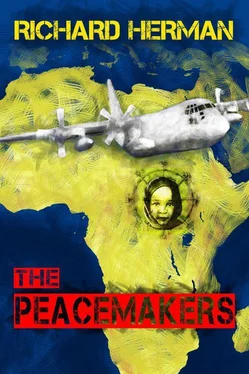His small wireless, the modern version of the walkie-talkie, vibrated in his hand. He pressed the receive button and held it to his ear. It was Jahel. “Do you see anything?” The sheik had spoken in the same quiet way when he had chastised BermaBur for his mother’s misconduct. That conversation had ended when Jahel had taken BermaNur’s horse, his most valuable possession. Without a horse, BermaNur was not able to join the marauding bands of Rizeigat and increase his family’s wealth. But once his family’s honor was restored, Jahel would return his horse, and with it, his personal honor. That was the way of the Rizeigat and the Baggara. BermaNur fumbled for the transmit button. “Nothing, sire.”
“Watch closely,” Jahel said. “We must stay hidden until the last possible moment. All depends on your warning.”
BermaNur’s heart beat fast. “I see it! It is far to the east.”
“Is it coming this way?”
The young Sudanese paused. This was the test he had been waiting for and he had to be right. Then, “Yes!”
“Good.” Jahel broke the connection. Now the teenager had to wait.
The white C-130 Hercules descended to 1200 feet above the ground and entered a racetrack pattern around the strip of road on the southern side of the ravaged village that served as a landing strip. The Hercules was an old workhorse of the United States Air Force and this particular aircraft had entered service in 1976. A coat of white paint belied the aircraft’s thirty-four-years of age and it was nearing the time when it would be consigned to the bone yard.
One of the UN relief workers made sure the villagers were clear of the road and fired a canister, laying green smoke to indicate wind direction and signal the four-engine cargo plane that it was safe to land. The pilot saw the smoke, entered a downwind leg, and called for the before landing checklist. The copilot started the flaps down and lowered the landing gear. The C-130 turned onto the base leg and the pilot marked the spot where she would touch down. It was a much-practiced routine. The pilot turned onto final approach and flew the big bird, nose high in the air, towards the touchdown point she had selected.
The copilot placed his left hand over the pilot’s right hand that controlled the throttles. It was a technique they had developed to prevent the pilot’s hand from bouncing off the throttles on a hard landing. She planted the C-130 hard in a controlled crash. The large tandem main wheels absorbed the shock, sinking a foot into the hard earth. The pilot slammed the nose onto the dirt road and jerked the throttles aft. The four propellers went into reverse as she stomped on the brakes, dragging the Hercules to a stop in less than 2000 feet.
BermaNur’s eyes followed the landing C-130 as it hurtled down the road, blasting dust out in front, and coming directly at him. His jaw went rigid when he thought the left outboard propeller would hit him. He closed his eyes and refused to move. But his perspective was wrong and the plane passed by with over twenty feet to spare. He breathed a sigh of relief as his communicator vibrated. He pressed the receive button. “Did you think it would hit you?” Jahel asked. His laughter filled BermaNur’s ear.
The teenage Baggara knew he was being watched, part of the test. “ Insh’ Allah ,” as God wills, he replied. It was one of the few Arabic phrases he knew. He turned towards the airplane as it backed up, its powerful props in reverse. The cargo door under the tail was raised and the loading ramp lowered to the horizontal position. A crewman wearing a headset stood on the ramp and directed the pilot. Inside, the teenager saw pallets piled with food. Again, he refused to move as the plane backed down the road and the wing passed over him. For a brief moment, he looked directly into the face of the pilot — a woman! Her blonde ponytail bounced as she turned and waved at him.
He could only stare at the nose of the big aircraft when it finally stopped far down the road and the starving villagers swarmed around it. The anger that threatened to consume him burned with a white-hot intensity. Because of a woman pilot Jahel was laughing at him! It was too much for any Fursan. He keyed the communicator. “It is a woman who pilots the airplane,” he told Jahel.
“Why do you speak of this?” Jahel asked.
“Do the Rizeigat beg from women?”
“Never,” Jahel said. There was no laughter in his voice now.
“It cannot be tolerated,” BermaNur said.
“Tell me when the airplane takes off,” Jahel said. The boy sat down to wait.
Exactly twenty-four minutes later, one of the propellers started to turn as the villagers who had swarmed near to get the food shipment, moved away from the airplane. Soon, all four engines were turning as the pilot called for the before takeoff checklist. She set the brakes as the engines spun up and the propellers bit into the air. The nose lowered as the roar of the turboprop engines beat at him. The nose came up when she released the brakes and the Hercules surged forward. The teenager didn’t move as the plane lifted off well before it reached him. The landing gear came up as it passed overhead. He made the radio call. “The infidels have taken off.” The Hercules climbed into the sky and turned to the east. “The infidels will fly directly over you,” he radioed.
BermaNur watched as the distinctive smoke trails of two shoulder-held surface-to-air missiles streaked from the ground, chasing down the lumbering aircraft. But someone on the Hercules saw the missiles and decoy flares popped in the aircraft’s wake. The aircraft took evasive action and jerked wildly, surprising him by its agility. He held his breath, afraid the aircraft would escape the fate Allah had willed. The two missiles missed and went ballistic. His eyes opened wide when the Hercules’s right wing folded up on its own and the plane rolled to the right.
The plane spun into the ground as a feeling of pure vindication flooded through the starving teenager. He shouted “ Allahu akbar! ” God is most great, at the top of his lungs as a pillar of smoke and flames mushroomed into the sky and a thundering roar momentarily shook the ground. He stood up and headed for the mob of villagers now running for the compound. He ran to find his mother and sister to ensure they had all the food they could carry. If not, he would have to beat them. His family’s honor demanded no less. It was the will of God.
E-Ring, The Pentagon
Every head turned when Fitzgerald entered the conference room. Since there were six lower-ranking generals present, the room was not called to attention, per Fitzgerald’s instructions. But everyone stood anyway. General John “Merlin” Fitzgerald, the Air Force Chief of Staff, commanded that level of respect. Fitzgerald was tall and solidly built, his face care-worn, and his salt and pepper hair cut short in a military haircut. The Chief of Staff’s bright blue eyes often danced with amusement — but not this morning.
Brigadier General Yvonne Richards stood on the opposite side of the table and studied his body language as he sat down, trying to read his mood. Fitzgerald was a much-studied commodity in her world, and she considered the way he used briefings to keep his staff on the same page, not to mention on edge, hopelessly old-fashioned.
“Seats, please,” Fitzgerald said. He turned to the large computer-driven display screen at the front of the room and the officer standing beside it. “Good morning, Colonel. Let’s have it.” Everyone knew what was on Fitzgerald’s mind.
“Good morning, sir,” the colonel said, starting the Power Point presentation. “I’m Colonel Robert Banks, chief of the Policy Division of the Office of Military-Political Affairs. As you know, the Air Force lost a C-130 yesterday morning in the Sudan.” A stylistic photo of a C-130 flashed on the screen. “The Hercules was part of the 4440th” — he pronounced it ‘forty-four fortieth’ — “Special Airlift Detachment providing support and flying relief missions for the United Nations peacekeeping force to the Sudan out of Malakal.” He had just told Fitzgerald what he already knew, not the best of beginnings, and missed the narrowing of Fitzgerald’s eyes. But not Richards. The general’s body language told her that he was not hearing what he wanted. Colonel Banks was a key member of her staff she was grooming for command, but he was in danger of suffering a professional death by Power Point. She gave him the high sign to move on.
Читать дальше












